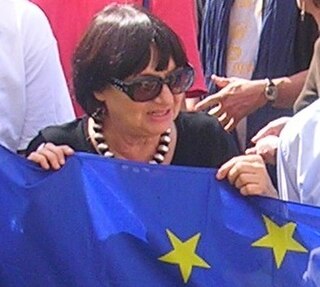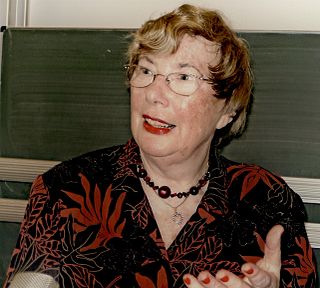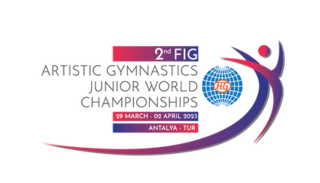This is a list of lists of universities and colleges by country, sorted by continent and region. The lists represent educational institutions throughout the world which provide higher education in tertiary, quaternary, and post-secondary education.

The United Nations General Assembly Resolution 194 is a resolution adopted near the end of the 1947–1949 Palestine war. The Resolution defines principles for reaching a final settlement and returning Palestine refugees to their homes. Article 11 of the resolution resolves that
refugees wishing to return to their homes and live at peace with their neighbours should be permitted to do so at the earliest practicable date, and that compensation should be paid for the property of those choosing not to return and for loss of or damage to property which, under principles of international law or equity, should be made good by the Governments or authorities responsible.

Luisa Morgantini is an Italian former Member of the European Parliament. She was elected as independent with the Communist Refoundation Party ticket and sat with the European United Left - Nordic Green Left group.

Athletics at the 2004 Summer Paralympics included 17 events for men and 15 events for women, in 5 disciplines. Athletes competed in one of four disability categories:
United Nations General Assembly Resolution 3236, adopted by the 29th Session of the General Assembly on November 22, 1974, recognizes the Palestinian people's right to self-determination, officializes United Nations contact with the Palestine Liberation Organization, and adds the "Question of Palestine" to the U.N. Agenda.
The Prince Claus Fund was established in 1996, named in honor of Prince Claus of the Netherlands. It receives an annual subsidy from the Dutch Ministry of Foreign Affairs.

Bilateral foreign relations exist between Austria and Israel. The fact that Adolf Hitler and other perpetrators of The Holocaust came from Austria gives the relationship between the two countries a special relevance. At the same time, the founder of Zionism, Theodor Herzl, also lived in Austria-Hungary and many Israelis are descendants of Austrian Jews. After the founding of Israel, the Second Austrian Republic recognized the Jewish state of Israel shortly after its founding in 1949, before official diplomatic relations were established in 1956. In the 1970s, Bruno Kreisky sought a role as mediator in the Middle East conflict and called for a Palestinian state, which caused disputes with the Israelis. Relations were later strained by the Waldheim affair in the 1980s and the first FPÖ government participation in 2000. After that, the two countries became close allies and established friendly relations. In 2023, Foreign Minister Alexander Schallenberg announced “we have entered into a strategic, extremely close relationship with Israel that can no longer be undone”. Within the EU, Austria is considered one of the most pro-Israeli countries.

Felicia Langer was a German-Israeli attorney and human rights activist known for her defence of Palestinian political prisoners in the West Bank and Gaza Strip. She authored several books alleging human rights violations on the part of Israeli authorities. She lived in Germany from 1990 and acquired German citizenship in 2008. In July 2009, President of Germany Horst Köhler awarded her the Federal Cross of Merit, First class, which is the fifth highest of Germany's federal order of merit's eight ranks. The bestowal triggered a public controversy because of her attitude towards the Israeli-Palestinian conflict. In 1990, she was awarded the Right Livelihood Award for "the exemplary courage of her advocacy for the basic rights of the Palestinian people."

The Palestinian diaspora, part of the wider Arab diaspora, are Palestinian people living outside the region of Palestine.
The Declaration on the Rights of Peasants is a United Nations General Assembly resolution on human rights with "universal understanding", adopted by the United Nations in 2018. The resolution was passed by a vote of 121-8, with 54 members abstaining.

The 2023 Junior World Artistic Gymnastics Championships was the second iteration of the Artistic Gymnastics Junior World Championships. They were held in Antalya, Turkey from 29 March to 2 April 2023.







